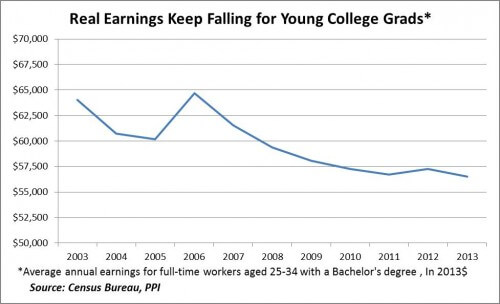Despite falling unemployment and a recovering labor market, young college graduates continue to struggle in today’s economy.
Analysis of new data reveals the real wages of young college graduates surprisingly fell in 2013, by 1.3 percent. The decline reverses a slight uptick in 2012, and continues along a ten-year trend in which real average earnings for young college graduates has fallen by a sizeable 12 percent since 2003. The chart below shows real average annual earnings for college graduates aged 25-34 working full-time with a Bachelor’s degree only.

This troubling trend presents significant political and economic challenges that policymakers can no longer afford to ignore. As consumers and taxpayers in their prime earning years, young college graduates represent one of the most important segments of the working population.
Politically, the continued struggle of well-educated Millennials sends a clear warning to progressives to support a more convincing growth agenda. A pro-growth agenda must be based on investment and innovation, instead of redistribution and more of the same debt-driven consumption of the last decade. Otherwise, young Americans, the vast majority of which voted overwhelmingly for Obama in 2008 and 2012, may change parties or stay home on Election Day.
Economically, falling real wages for young college graduates is resulting from what I call The Great Squeeze. That is, more young college graduates are finding themselves underemployed – taking lower skill jobs for less pay at the expense of their less educated peers. The continuation of this trend, five years after the Great Recession, suggests this problem is more than just temporary. (While this is for BA only, the trend is the same for those with a BA or higher.)
The Great Squeeze is rooted in demand-side and supply-side factors. On the demand-side, the high underemployment plaguing young college graduates is connected back to the slow-growth economy. Our education, tax, and regulatory policies have failed to adapt to the realities of a data-driven world, keeping investment and high-wage job creation on the sidelines. Here simply having a college degree is not enough to guarantee success. In fact, a recent study from the Federal Reserve found that one-quarter of college graduates earned the same amount as those with a high school diploma or GED.
And on the supply-side, colleges are failing to adequately prepare college graduates for the high-skill, high-wage jobs that are being created in fields like data analytics and tech. For example, although far more women were awarded degrees in 2013 than men, most majored in business, health-related disciplines, education, and psychology.* It is hardly surprising that more data and tech employers are turning to alternative training models to meet their workforce needs. Yet in spite of the mismatch, if anything, our federal student aid system is exacerbating the imbalance.
In short, there are two main takeaways here for policymakers: (1) we need better policies in place to encourage employers to invest and create jobs domestically, and (2) young Americans need a postsecondary education system that is better aligned with the shifting nature of the labor force.
*Author’s tabulation of 2013 IPEDS data.



